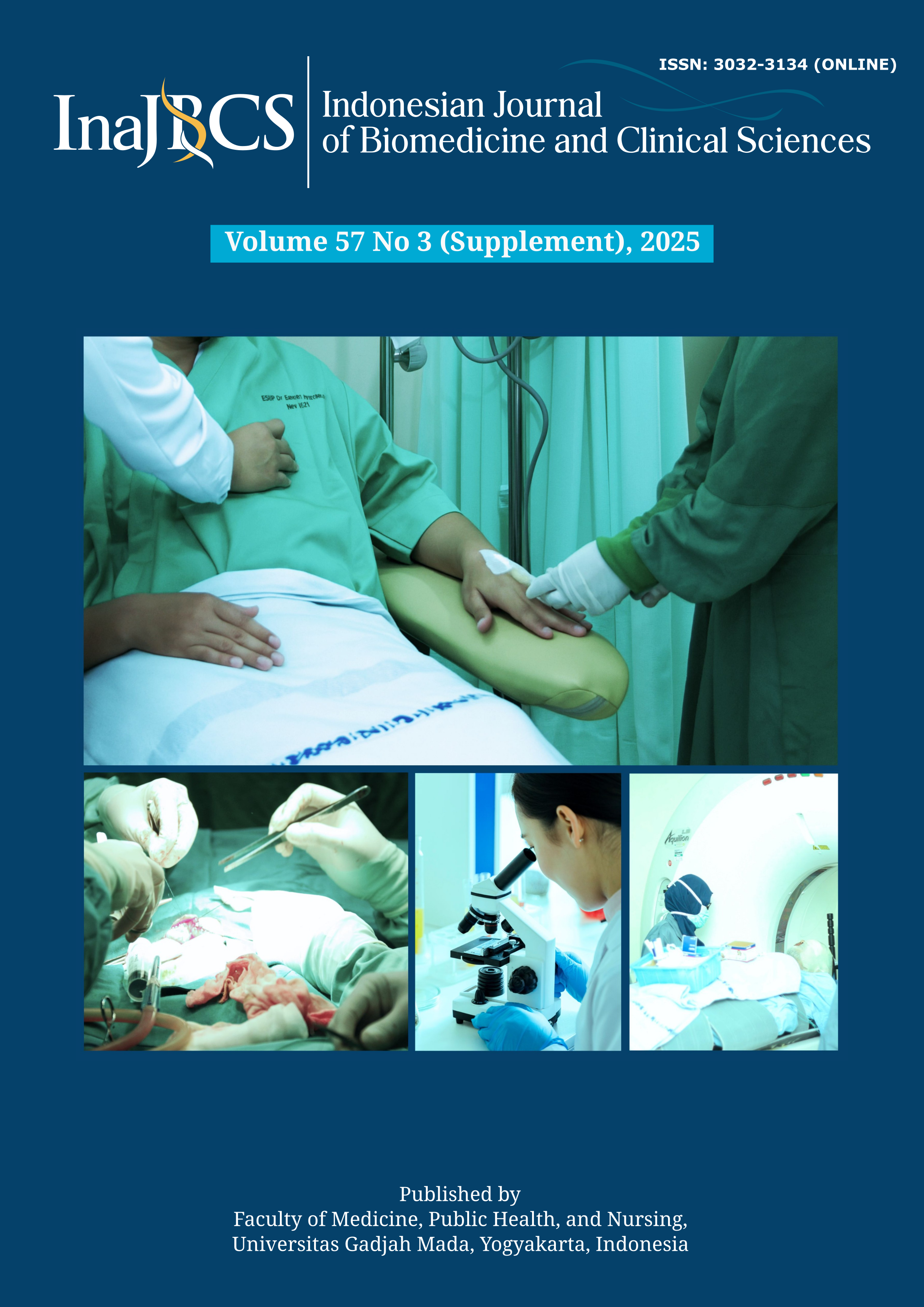Management strategies for prolonged hypocalcemia in thyroid cancer patients after thyroidectomy and radiofrequency ablation
Abstract
Hypocalcemia is one of the serious metabolic complications that can occur after thyroid interventions such as thyroidectomy or radiofrequency ablation (RFA). This condition is mainly caused by parathyroid gland injury or vascular impairment leading to decreased parathyroid hormone (PTH) secretion and subsequently reduced serum calcium levels. Although RFA is recognized as a minimally invasive procedure increasingly used for recurrent thyroid lesions, prolonged hypocalcemia remains a potential complication that must be carefully anticipated, since it may result in severe clinical manifestations such as paresthesia, muscle spasms, tetany, generalized seizures, laryngospasm, and even life-threatening arrhythmias. We report a case of a 40-year-old woman with recurrent thyroid carcinoma who, 14 days after undergoing RFA, presented with generalized weakness accompanied by spasms of both hands. Laboratory findings revealed severe hypocalcemia with ionized calcium 0.44 mmol/L, elevated TSH level up to 11.4 µIU/mL, and hypomagnesemia (Mg 1.80 mg/dL). Initial management included intravenous calcium gluconate and magnesium sulfate to correct the acute deficiency, followed by maintenance therapy with levothyroxine 100 mcg daily, calcium carbonate 500 mg three times daily, oral magnesium 100 mg, and vitamin D 1000 IU per day under close electrolyte monitoring. After 10 days of hospitalization, the patient showed significant clinical improvement with recovery of consciousness and reduction of muscle spasms. This case discussion highlights that hypomagnesemia exacerbates hypocalcemia by impairing PTH secretion and action, while post-ablation hypothyroidism further contributes to calcium metabolism disturbances. Therefore, management strategies must be multifactorial, including adequate correction of calcium and magnesium levels, vitamin D supplementation, and thyroid hormone replacement. This case emphasizes the importance of early detection, comprehensive treatment, and continuous monitoring of prolonged hypocalcemia following RFA, in order to prevent severe complications and to preserve the patient’s quality of life.
Hipokalsemia merupakan salah satu komplikasi metabolik serius yang dapat timbul setelah dilakukan tindakan terhadap kelenjar tiroid seperti tiroidektomi maupun radiofrequency ablation (RFA). Kondisi ini terutama disebabkan oleh kerusakan jaringan paratiroid atau gangguan vaskularisasi yang mengakibatkan penurunan sekresi hormon paratiroid (PTH), sehingga kadar kalsium serum menurun. Walaupun RFA dikenal sebagai prosedur minimal invasif yang semakin sering digunakan pada lesi tiroid rekuren, komplikasi berupa hipokalsemia berkepanjangan tetap harus diwaspadai karena dapat menimbulkan gejala klinis berat seperti parestesia, spasme otot, tetani, kejang generalisasi, laryngospasme, hingga aritmia fatal yang mengancam nyawa. Kami melaporkan kasus seorang perempuan berusia 40 tahun dengan karsinoma tiroid rekuren yang, 14 hari setelah menjalani RFA, mengalami kelemahan umum disertai kejang kaku pada kedua tangan. Pemeriksaan laboratorium menunjukkan hipokalsemia berat dengan kadar ion kalsium 0,44 mmol/L, kadar TSH meningkat hingga 11,4 µIU/mL, serta hipomagnesemia (Mg 1,80 mg/dL). Penatalaksanaan awal dilakukan dengan pemberian kalsium glukonas intravena dan magnesium sulfat intravena untuk mengoreksi defisiensi akut, kemudian dilanjutkan terapi pemeliharaan berupa levothyroxine 100 mcg per hari, kalsium karbonat 3×500 mg, magnesium oral 100 mg, serta vitamin D 1000 IU per hari dengan pemantauan elektrolit ketat. Setelah 10 hari perawatan, pasien menunjukkan perbaikan klinis signifikan dengan kesadaran membaik dan spasme berkurang. Diskusi kasus ini menekankan bahwa hipomagnesemia berperan memperberat hipokalsemia melalui hambatan sekresi dan aksi PTH, sementara hipotiroidisme pasca ablasi turut mempengaruhi metabolisme kalsium. Oleh karena itu, strategi tata laksana harus bersifat multifaktorial, meliputi koreksi kadar kalsium, magnesium, suplementasi vitamin D, serta penggantian hormon tiroid secara adekuat. Kasus ini menegaskan pentingnya deteksi dini, tatalaksana komprehensif, serta pemantauan berkelanjutan pada hipokalsemia berkepanjangan pasca-RFA, agar komplikasi berat dapat dicegah dan kualitas hidup pasien tetap terjaga.






